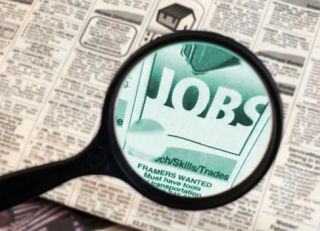Creativity
The Difference Between Cliffs and Comebacks
Unemployment is the primary cause of budget deficits, so let's focus on jobs!
Posted January 7, 2013

The chart below shows in a very clear way that unemployment and deficits are correlated--every time unemployment rises, the budget deficit also rises. This is because the budget deficit is primarily a function of the government's inability to collect enough tax revenue from unemployed people. The most recent proof of this was the Clinton economic recovery that turned the first Bush's deficits into surpluses, and was powered by 20 million new jobs, driven by the growth of the Internet.
What President Obama needs to do is reframe the cliff/ceiling negotiations and bring the focus back on job growth. Instead of "refusing to negotiate" the debt ceiling, he needs to shift the playing field in a way that George Lakoff would be proud of. Here's an idea: Reframe the "debt ceiling" as the growth ceiling, just like the GOP did by renaming the inheritance tax... the "death tax." Also, use this chart over and over and over... to bring home the point that if we can just get people back to work, then the deficit will shrink naturally.
Of course, there has to be a balanced approach to reducing spending and a bloated military industrial complex, but these curtailments must not affect the core funding that is required to stimulate job growth--in more optimal sectors of the economy. In other words, we don't need more minimum wage jobs and temporary jobs--we need great jobs that make lots of money and insure a livelihood for Americans into the future. We need strategic job growth.

The key to strategic job growth is to find the next great engine of economic growth and prosperity --finding "The Next Big Thing." Congress needs to settle down and start making smart and strategic investments in innovation and scientific research.
Recoveries are powered by people who actually make stuff--like great mobile phones and apps, cars and planes, food and pharmaceuticals, energy and ways to conserve energy. The reason that America surged in the 1960s, 1980s, and late 1990s isn't because of anything the government did, it was due--wholly and completely--to innovation. The mainframe revolution hit in the late 1950s and generated about $5 billion in the sales of chips that powered an economic growth spurt that we can call the first wave of the computing revolution--as well as increased core efficiency for the companies using those mainframes. Similarly, the PC revolution hit in the late 1970s, launched the second wave, and generated about $25 billion in chip sales. And more recently, the Internet revolution powered both the third wave, by generating $200 billion in chip sales. Each wave of innovative growth produced millions of the right kind of jobs.
Our problem isn't that we've become a welfare state or that universal healthcare is too expensive or that grandma needs to tighten her belt. Grandma and Grandpa already tightened their belts plenty putting YOU through school. Our problem: We're beginning to lose the brain game. Everyone "out there" is catching up. However, the solution isn't to slow "them" down, but to get off our sofas, stop wasting our time playing videogames, and for Congressmen to stop threatening a "partial government shutdown." (This sort of thing hurts our country.)
Instead, we must, as a country with a unified spirit, start making stuff and being smart again. This means that we must invest heavily in finding the next big thing that could power the "fourth wave" of the Information Revolution. Nobody knows what it will be exactly, but let's be clear: established corporations are not going to invent it. Big companies and one-percenters are great at creating wealth, but they are not that good at creating jobs. The next big thing will most likely be invented by some tiny little startup you've never heard of. A World Bank study found that the vast majority of technological value today is held in companies that did not exist 10 or 20 years ago. It's always the new thing and the next thing that matters.
Therefore, it's time to get serious about leading the world again in innovation, and we can do this by addressing the following three challenges:
First, Congress should pass a bill to set up a 10-year tax holiday for capital gains by angel investors in any new high-tech startup that hires more than 10 Americans. Notice I said angel investors. It's time to transition from "one-percenter blue-blood VCs" to the new breed of lean and mean, hands-on angel investors. That includes crowdfunding. And notice I said Americans. If such tax advantages exist, those nice juicy jobs will stay in America, especially if there were a job training credit available. Money would flood into early stage startups to create a million high-potential strategic jobs overnight.
Second, put more money into higher education and retrain America for the future. At the moment, eight of the top ten universities are in the US and two are in the UK. Yale University President Richard Levin estimates that within 25 years, the universities of Tsinghua and Peking will enter the Top Ten and squeeze out some of America's elite campuses. We are definitely falling behind and it's going to require serious money to catch up again. Levin has said that the Chinese government now spends billions of yuan, at least 1.5 percent of its gross domestic product, on higher education. Do we have the guts to invest in our children, and our own future, at this level?
And third, invest courageously in technology infrastructure and science grants. If America seeks to make a comeback, it means we need to make big and risky bets on things that will provide decent odds at stumbling on a winner. There's no way to predict what will win, so stop trying to make political hay out of isolated losing bets like Solyndra. If the overall ROI of the portfolio is healthy, then it's fine to make gutsy bets. The country needs a more innovative portfolio approach to science and technology spending that isn't afraid of individual failures--we're going to see plenty of failures in risky technologies in everything from renewable energy to nano batteries to self-driving cars to 3D printing to personalized medicine to quantum computing. It's the rare and exceptional winner that make it all worthwhile. This goes for both enterprises and countries.
The recession is coming to an end, and groundwork for a real recovery is now set. Patent applications are at an all-time high. Investors are looking at startups again. And a team that believes in science and knows how to leverage technology is in the White House. This is the team that made a very risky bet on "Maya," as dramatized in the recent film Zero Dark Thirty. When all the guys in suits were covering their asses with 60 percent probabilities, she had the guts to bet her career on her vision, and the White House had the guts to bet the ranch on her. No guts, no glory.
Now it's time to bet the ranch on innovation. It's time to focus, like an obsessed CIA analyst with an all consuming objective, on the Next Big Thing. The next Internet. The next Google. The next Facebook.
Don't focus so much on the ceiling, but rather, on how to break through it.




